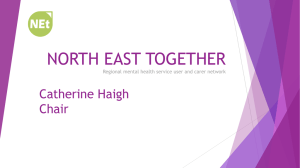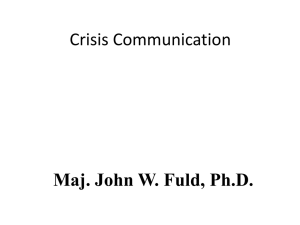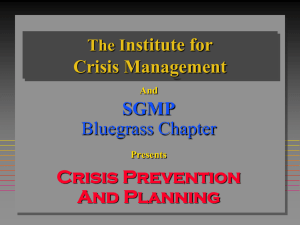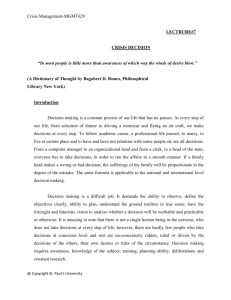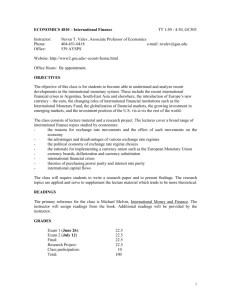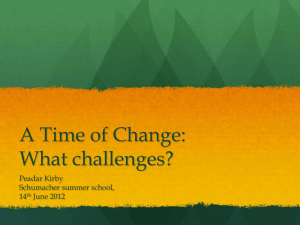Contemporary International Crises
advertisement
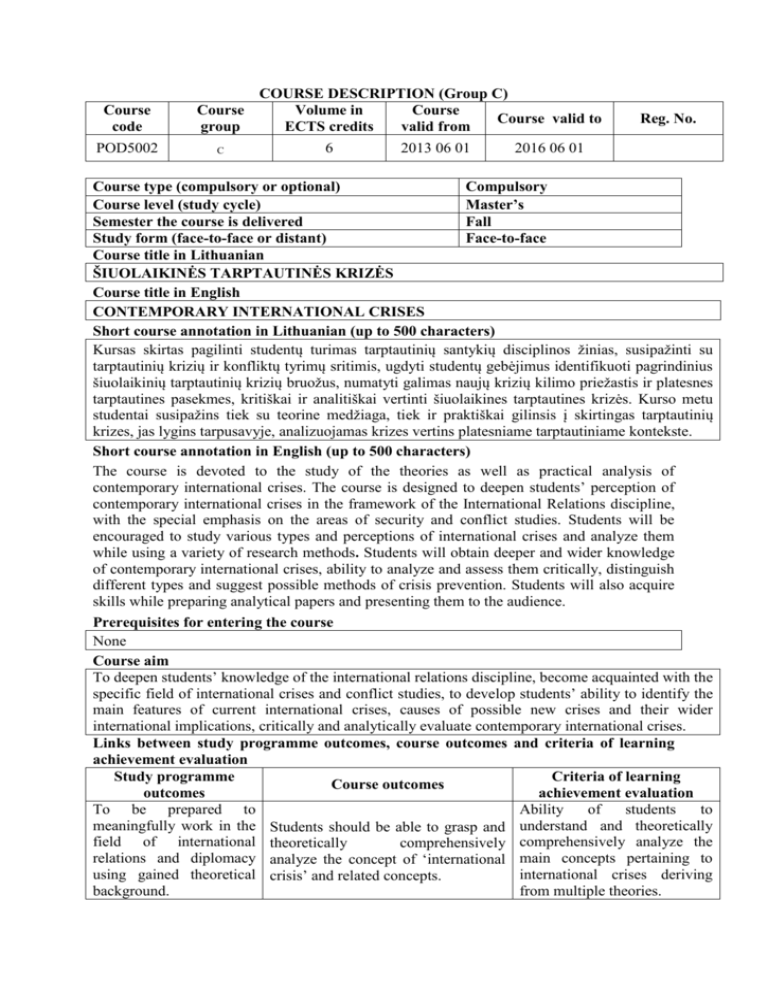
Course code POD5002 COURSE DESCRIPTION (Group C) Course Volume in Course Course valid to group ECTS credits valid from 6 2013 06 01 2016 06 01 C Reg. No. Course type (compulsory or optional) Compulsory Course level (study cycle) Master’s Semester the course is delivered Fall Study form (face-to-face or distant) Face-to-face Course title in Lithuanian ŠIUOLAIKINĖS TARPTAUTINĖS KRIZĖS Course title in English CONTEMPORARY INTERNATIONAL CRISES Short course annotation in Lithuanian (up to 500 characters) Kursas skirtas pagilinti studentų turimas tarptautinių santykių disciplinos žinias, susipažinti su tarptautinių krizių ir konfliktų tyrimų sritimis, ugdyti studentų gebėjimus identifikuoti pagrindinius šiuolaikinių tarptautinių krizių bruožus, numatyti galimas naujų krizių kilimo priežastis ir platesnes tarptautines pasekmes, kritiškai ir analitiškai vertinti šiuolaikines tarptautines krizės. Kurso metu studentai susipažins tiek su teorine medžiaga, tiek ir praktiškai gilinsis į skirtingas tarptautinių krizes, jas lygins tarpusavyje, analizuojamas krizes vertins platesniame tarptautiniame kontekste. Short course annotation in English (up to 500 characters) The course is devoted to the study of the theories as well as practical analysis of contemporary international crises. The course is designed to deepen students’ perception of contemporary international crises in the framework of the International Relations discipline, with the special emphasis on the areas of security and conflict studies. Students will be encouraged to study various types and perceptions of international crises and analyze them while using a variety of research methods. Students will obtain deeper and wider knowledge of contemporary international crises, ability to analyze and assess them critically, distinguish different types and suggest possible methods of crisis prevention. Students will also acquire skills while preparing analytical papers and presenting them to the audience. Prerequisites for entering the course None Course aim To deepen students’ knowledge of the international relations discipline, become acquainted with the specific field of international crises and conflict studies, to develop students’ ability to identify the main features of current international crises, causes of possible new crises and their wider international implications, critically and analytically evaluate contemporary international crises. Links between study programme outcomes, course outcomes and criteria of learning achievement evaluation Study programme Criteria of learning Course outcomes outcomes achievement evaluation To be prepared to Ability of students to meaningfully work in the Students should be able to grasp and understand and theoretically field of international theoretically comprehensively comprehensively analyze the relations and diplomacy analyze the concept of ‘international main concepts pertaining to using gained theoretical crisis’ and related concepts. international crises deriving background. from multiple theories. Students should be able to critically assess the use of terms and concepts related to contemporary international crises in political and academic discourses. Gain skills for independent identification Students should be able to critically and analysis of the main evaluate practical tackling of major challenges in the practical contemporary international crises. sphere of international relations and diplomacy. Ability of students to identify and independently critically assess the use of terms and concepts related to contemporary international crises in political and academic discourses. Ability of students to independently critically evaluate processes surrounding efforts at solving pending international crises, especially the West’s dealings with the developing world. Link between course outcomes and content Course outcomes Content (topics) 1. Students should be able to grasp and theoretically comprehensively 1.International crises: theories on actors, analyze the concept of ‘international prevention, management. crisis’ and related concepts. 2. Political and academic rhetoric on: 2. Students should be able to critically a)War on terror: Afghanistan and Iraq assess the use of terms and concepts b)European backyard: Balkans and Russia related to contemporary international c)Africa: Sahel and Horn of Africa crises in political and academic d)Arab Awakening discourses. e)Loose nukes: Iran and North Korea 3.Practical actions in tackling crises surrounding: 3. Students should be able to critically a)War on terror: Afghanistan and Iraq evaluate practical tackling of major b)European backyard: Balkans and Russia c)Africa: Sahel and Horn of Africa contemporary international crises. d)Arab Awakening e)Loose nukes: Iran and North Korea Study (teaching and learning) methods In-class: lectures, discussion, seminars, disputes, group work; Out-of-class: reading, essay writing, book reviews. Methods of learning achievement assessment Oral presentations, discussions, essays Distribution of workload for students (contact and independent work hours) Lectures – 30 h.; seminars - 15 h.; independent work - 135 h. Total - 180 h. Structure of cumulative score and value of its constituent parts Presentation of assigned text – 10 %; Leading a discussion – 15 %; Mid-term exam (book review) – 25 %; causes, Final exam (paper) – 50 % Recommended reference materials No. Publication Authors of year publication and title Publishing house Number of copies in University Self-study Other library rooms libraries Basic materials Joseph S., Nye, Understanding International 1. 2008 Longman 1 Conflicts: An Introduction to Theory and History. Krahmann Elke, New Threats and New Palgrave 2. 2005 Actors in 1 Macmillan International Security. Supplementary materials Stetter Stephen, Territorial Conflict in World Society. 1. 2007 Modern Systems Routledge 1 Theory, International Relations and Conflict Studies. Kaldor Mary, New Polity, 2. 2006 and Old Wars (2nd 1 Cambridge ed.). Kaldor M., Terry Lynn Karl and Yahia 3. 2007 Pluto Press 1 Said, Oil Wars. Axlerod Robert M., Princeton 4. 1997 Complexity of University 1 Cooperation. Press Kinsey Christopher, 5. Corporate Soldiers 2006 Rutledge 1 and International Security. Morgan M. Patrick, 6. International CQ Press, 2006 1 Security: Problems Washington and Solutions. Course programme designed by Prof. Egdūnas Račius, Dr. Gerda Jakštaitė 1 (Štromo bibliotekoje)
